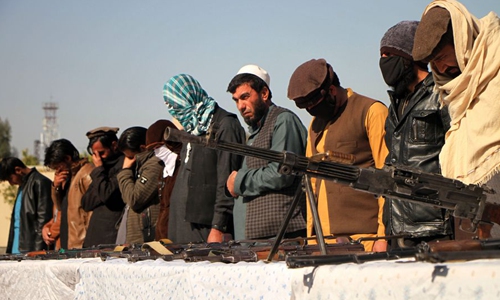The marathon US-Taliban talks, after experiencing ups and downs, have inched towards a conclusion as both sides, according to US sources, are expected to ink a peace deal soon.
The optimism on signing a peace deal to end the war in Afghanistan and meet the Taliban demand for the withdrawal of the US-led forces from the country has increased, after the Taliban outfit agreed to reduce violence in the central Asian state.
During a telephone conversation on Tuesday, US Secretary of State Mike Pompeo informed Afghan President Mohammad Ashraf Ghani that “notable progress” had been made in the talks with the Taliban and the armed group agreed on “significant reduction” in violence.
However, Afghan observers are less optimistic about the signing of a peace deal, believing the outcome of the US-Taliban talks, which have been held behind closed doors in Qatar capital Doha, have hit ambiguity.
According to the observers, the post-peace strategy of Taliban is still unclear and no one knows if the armed outfit wants to revive its Islamic Emirate of Afghanistan dethroned by the US-led military invasion in late 2001.
“Obviously the outcome of the 11th round of talks between the US delegation and the Taliban group would have no difference than the 10th round of talks,” political analyst Nazari Pariani told Xinhua.
According to Pariani, inking a peace deal between the two sides maybe suspended again as both sides are bargaining to ensure their own interests.
The US delegation has held a series of peace talks with the Taliban representatives since October 2018.
According to Afghan experts, the talks were shadowed by ambiguity as no Afghan knows what would happen after inking the expected peace deal and the hasty withdrawal of the US-led forces from Afghanistan.
“The reduction of violence offered by the Taliban is a meaningless terminology and neither the Taliban nor the government has made a clear definition of the language,” said retired army general and military expert Atiqullah Amarkhil.

According to the expert, the term of “violence reduction” would confuse the security forces on battleground as to what to do if attacked.
The majority of the war-weary Afghans are fluctuating between fear and hope over what would take shape in their country after signing the peace deal if the Taliban rejects to join the government and stresses to impose its ousted Islamic Emirate, according to local analysts.
The Taliban regime had outlawed education for girls and banned all kinds of entertainment including airing television serials.
“Any peace would be fragile in Afghanistan if the government and the people of Afghanistan are bypassed in the peace talks,” renowned analyst Ahmad Sayedi told local media.


